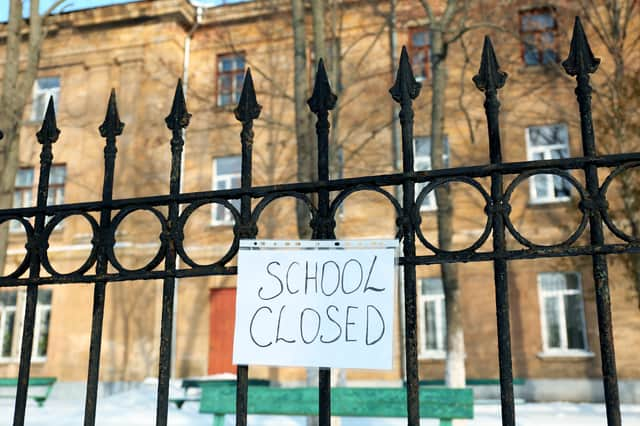All schools in England to close due to coronavirus outbreak - but not for the children of ‘key workers’


The government has announced that it will close all schools in England, following similar announcements in Scotland, Wales, and Northern Ireland.
Education Secretary, Gavin Williamson, told the House of Commons that the country was in “an extremely challenging time” and that all schools will close their gates on Friday afternoon (20 Mar) for the foreseeable future.
Advertisement
Hide AdAdvertisement
Hide AdThe devolved governments of Scotland, Wales, and Northern Ireland had all previously announced school closures.
Until now, Downing Street had resisted pressure to close schools, citing the fact that doing so would make it difficult for parents to attend work. Speaking at a press conference, the Prime Minister did not confirm when schools would reopen.
Key worker exemptions
Mr Johnson said the schools closure would not apply to the children of key workers, such as NHS staff and police officers.
The government has not yet outlined which jobs fall into the category of key workers.
Exams cancelled
Advertisement
Hide AdAdvertisement
Hide AdMr Johnson also confirmed that the schools closure would mean the cancellation of exams scheduled for May and June this year, but insisted that the government “will make sure children will get the qualifications they need and deserve”.
He also said he “totally understands” the frustrations of students and parents, and said the government would ensure that children were “not impeded” because of the cancellations, but refused to give details on how.
It is still unclear how this will impact on future university admissions processes.
Free school meals
The Prime Minister said that the government was taking steps to ensure that children who were eligible for free school meals would still be fed.
Advertisement
Hide AdAdvertisement
Hide AdAround 300,000 children in the UK are eligible for free school meals.
Coronavirus: the facts
What is coronavirus?COVID-19 is a respiratory illness that can affect lungs and airways. It is caused by a virus called coronavirus.
What caused coronavirus?The outbreak started in Wuhan in China in December 2019 and it is thought that the virus, like others of its kind, has come from animals.
How is it spread?As this is such a new illness, experts still aren’t sure how it is spread. But.similar viruses are spread in cough droplets. Therefore covering your nose and mouth when sneezing and coughing, and disposing of used tissues straight away is advised. Viruses like coronavirus cannot live outside the body for very long.
Advertisement
Hide AdAdvertisement
Hide AdWhat are the symptoms?The NHS states that the symptoms are: a dry cough, high temperature and shortness of breath - but these symptoms do not necessarily mean you have the illness. Look out for flu-like symptoms, such as aches and pains, nasal congestion, runny nose and a sore throat. It’s important to remember that some people may become infected but won’t develop any symptoms or feel unwell.
What precautions can be taken?Washing your hands with soap and water thoroughly. The NHS also advises to cover your mouth and nose with a tissue or your sleeve (not your hands) when you cough or sneeze; put used tissues in the bin immediately and try to avoid close contact with people who are unwell. Also avoiding touching eyes, nose and mouth unless your hands are clean.
Government adviceAs of the 12 March the Government has moved into the "delay" phase of its plan to tackle coronavirus. Advice is that anyone with a continuous cough or high temperature should self-isolate for seven days. People over 70 have been advised not to go on cruises and schools advised to cancel trips abroad, though schools remain open.
Should I avoid public places?Most people who feel well can continue to go to work, school and public places and should only stay at home and self isolate if advised by a medical professional or the coronavirus service.
Advertisement
Hide AdAdvertisement
Hide AdWhat should I do if I feel unwell?Don’t go to your GP but instead call NHS 111 or look online at the coronavirus service that can tell you if you need medical help and what to do next.
When to call NHS 111NHS 111 should be used if you feel unwell with coronavirus symptoms, have been in a country with a high risk of coronavirus in the last 14 days or if you have been in close contact with someone with the virus.
Sources: World Health Organisation and NHS